Thursday Feb 19, 2026
Thursday Feb 19, 2026
Thursday, 6 June 2024 00:30 - - {{hitsCtrl.values.hits}}
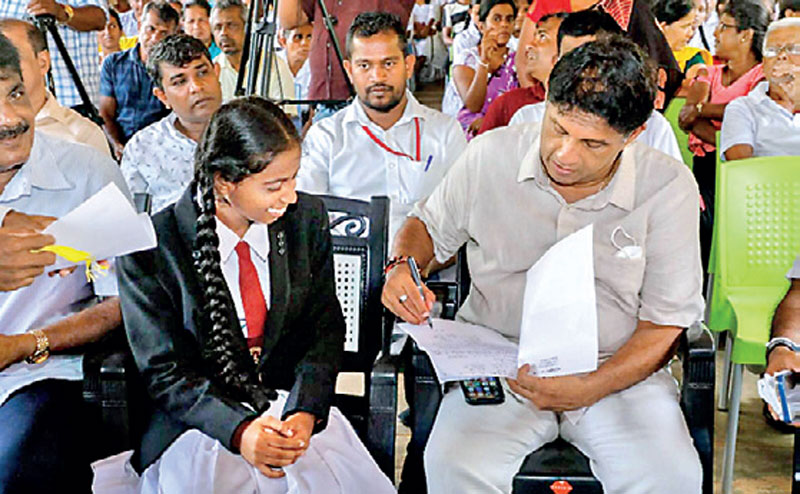
Enabling education first
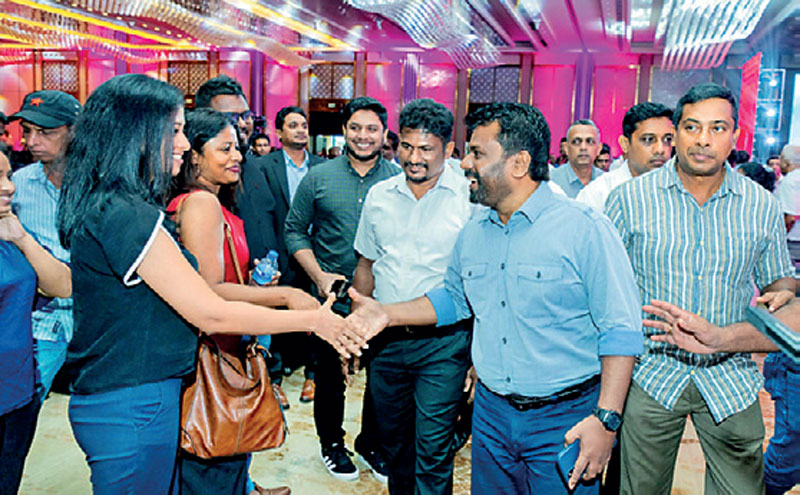
At Engineers Convention
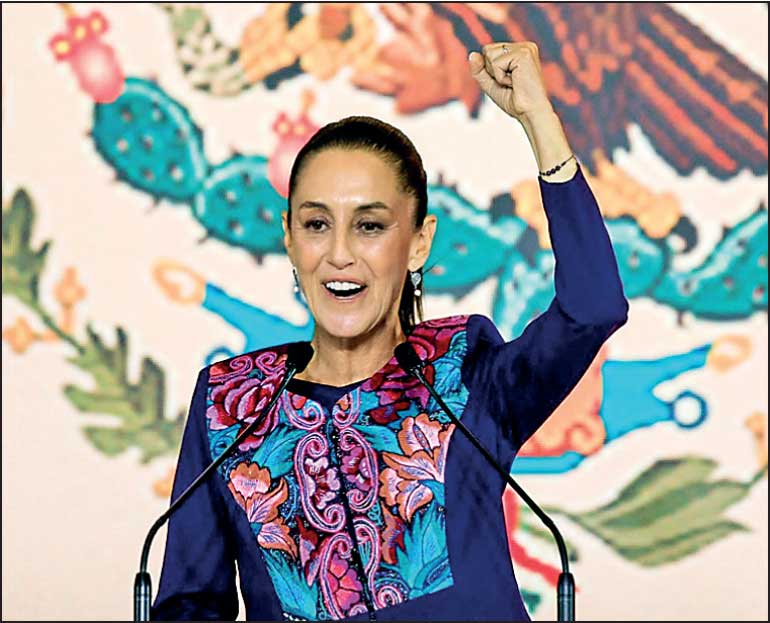
Leftist Claudia Sheinbaum, PhD, Mexico’s first woman President
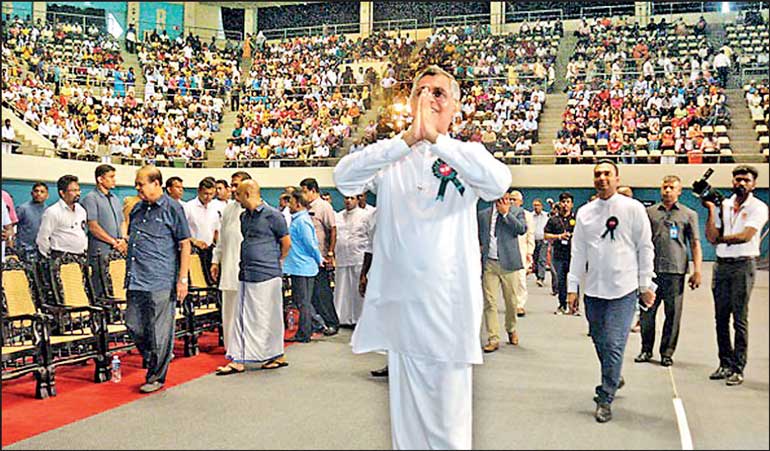
Champika’s chances
“…She [Dr. Claudia Sheinbaum] aims to maintain Mexico’s state-owned Petroleum and Electricity companies that have been favored by López Obrador despite their immense debts…” (https://www.politico.com/news/magazine/2024/06/01/claudia-sheinbaum-mexico-presidential-election-00161081)
 Another booster for Left presidential candidates everywhere. On the heels of the election of a leftwing President in Senegal, Mexico, one of the most important countries of the global South, has elected Dr Claudia Sheinbaum by a landslide as its first-ever woman President. AP News called her “a lifelong leftist” while The Guardian (UK) announced that “Sheinbaum, a leftwing climate scientist and former mayor of Mexico City, won the presidency with between 58.3% and 60.7% of the vote”.
Another booster for Left presidential candidates everywhere. On the heels of the election of a leftwing President in Senegal, Mexico, one of the most important countries of the global South, has elected Dr Claudia Sheinbaum by a landslide as its first-ever woman President. AP News called her “a lifelong leftist” while The Guardian (UK) announced that “Sheinbaum, a leftwing climate scientist and former mayor of Mexico City, won the presidency with between 58.3% and 60.7% of the vote”.
Described by CNN as ‘secular leftist’ in her mayoral politics, she nonetheless “kept an image of the Catholic Virgin of Guadalupe on her desk as mayor of Mexico City” reported Politico. Sheinbaum, whose parents are “of Jewish origin” (her terminology), has a PhD in energy engineering from Berkeley. Candidate of the leftist ruling party Morena, her mentor was iconic left-populist President Lopez Obrador.
Dr Sheinbaum disclosed that at this election she did not vote for herself but for 93-year-old leftist veteran Ifigenia Martinez, as tribute to her history of struggle.
“A long-time leftist activist…a social activist deeply engaged with Mexico’s left” (Politico), Sheinbaum describes herself as “a child of the 1968 youth uprising” in Mexico, because her parents were student activists at the time, who became respected professors and belong to Mexico’s academic elite.
Claudia Sheinbaum’s economic doctrine is crucially relevant to Sri Lanka on the eve of the Economic Transformation Bill and the Presidential election. She absolutely nails the issues, which makes her landslide victory no surprise:
“…people want change. It’s a change from an economic model, neoliberalism which is now in the past. And we have now a government that thinks [about] the majority...
…States have to give the rights to the people. What do we think is a right? Education, health, a home, pension for all the elders. We also believe in strategic areas of the economy such as energy. The state has to be part of this, especially electricity, oil and mainly and now lithium…it’s important and it’s going to be very important in the future…You cannot have private investment measured only by GDP or international investment. You have to measure investment, public and private, in wealth for the people. And that’s the big difference with neoliberalism that believed that everything was going to be solved by the market.”
Claudia Sheinbaum’s pragmatic progressive economic perspective gives us Sri Lankan citizens a template. We, the Sri Lankan citizens should opt for the closest approximation of these views in our national discourse and shun those whose discourse is the exact opposite or the furthest from it. Her perspective provides a rough roadmap out of our crisis.
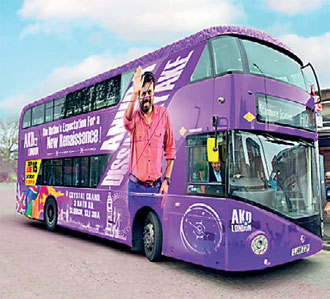 |
| Gen Z on board? |
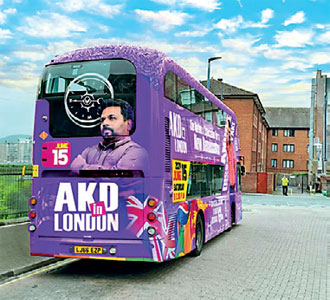 |
| AKD gets ahead
|
Return of the “17-year curse”
Making a raucous, near-hysterical ideological attack on the JVP and leftism in general in his speech to the SJB’s peasant rally in Trincomalee (June 2nd), Eran Wickremaratne asserted that the country’s economic development had long been impeded by obstructionist leftist slogans and agitation. He gave the successful student struggle against SAITM, the private medical school, as an example.
Eran followed that up with a shocker. He announced that just as the UNP governed the country for 17 years, the (presumptively) victorious SJB too would rule for 17 years. (https://fb.watch/srNhrQQi8p/?)
That’s a horrifying prospect: the UNP’s 17 years encompassed a referendum postponing General Elections, Black July ‘83, two civil wars, a foreign military intervention, and cost hundreds of thousands of lives.
Ranasinghe Premadasa whose brief tenure of four years was the developmental zenith of those 17 years, never regarded the UNP’s long stay as anything like a golden age. Accepting the presidential nomination in October 1988 at Sugathadasa Indoor Stadium, he famously referred to the legacy of the previous decade as “a torch burning at both ends” which was handed to him. He regarded the flames as having been lit by the inequitous iniquities of the economic model and overall policy follies of the elitist UNP Establishment.
Sajith Premadasa has chosen to surround himself with the same elitist-types pushing the same economic philosophy and policies that ignited the fires at both ends of the torch thrust upon his father.
A 17-year or continuous multi-term stint under the UNP’s successor party the SJB --dominated by an Economic Council with antediluvian rightwing ideology-- is wildly unlikely. What is far likelier is that if the SJB as currently constituted wins, it will be such a polarising administration that it will follow the path of every Ranil Wickremesinghe administration to date, and be a conflict-ridden one-term episode.
Referendum recoil
The remarks by the UNP General-Secretary on the extension of the terms of office of President Wickremesinghe and the current Parliament, were restated by Prof Ashu Marasinghe, an advisor (and Rottweiler) of President Wickremesinghe, then reiterated at length by Range Bandara himself at a media briefing on Monday, June 3rd and at much greater length on Derana 360. The suggestion of a Referendum must therefore be understood as a ‘probe’ of a political project of the UNP leadership.
What Palitha Range Bandara, reinforced by Prof Ashu Marasinghe, succeeded in doing was almost unimaginable: create a spontaneous, cross-party consensus of utter and absolute rejection. After Range Bandara’s first articulation on May 28th the ruling SLPP’s national organiser Namal Rajapaksa was fastest on the draw and shot the idea down with an X. Condemnation came thick and fast from the ex-UNP Samagi Jana Balavegaya (SJB) the main parliamentary Opposition, and the left-populist JVP-NPP.
The denunciation by civil society actors, most significantly by the Lawyers Collective, had a whiff of Aragalaya assertiveness.
The R-word, ‘Referendum’, and the E-word, ‘Extension’ of term, trigger collective trauma and rage, because of the social and national experience of the two civil wars of the 1980s, clearly sourced in the Referendum of December 1982 which postponed the General Election of early 1983.
It is far easier for an incumbent to lose a Referendum than a straightforward election. Wickremesinghe just has to ask his pal David Cameron (who will probably be out of his job by July 5th). Brexit took just two politicians—Boris Johnson and Nigel Farrage—and a big bright ‘battle bus’.
In Sri Lanka it will have the whole Opposition actively campaigning for a NO vote. Tiran Alles and Kamal Gunaratne can’t help Ranil win a Referendum. Even the powerful Chilean dictator Augusto Pinochet lost one, which fast-tracked the end of his iron rule.
Ranil’s electoral role
The only thing the Wickremesinghe candidacy is doing is splitting the ‘economic liberal’ or ‘center-right’ vote, without holding even a third of it. Once again, Ranil is the dog-in-the-manger: unable to take the UNP voter to victory, and unwilling to exit the race, giving another leader the best possible chance.
In 1988 Ranjan Wijeratne, the UNP’s tough General Secretary, was commissioned by President Jayewardene to conduct an island-wide survey as to who the UNP’s best Presidential candidate would be. The choices were R. Premadasa, Gamini Dissanayaka and Lalith Athulathmudali. Once Ranjan’s unambiguous recommendation came in, JR endorsed Premadasa, however reluctantly (possibly while hoping Sirimavo Bandaranaike would win).
If Ranil actually stands for quintessential economic continuity, he should –logically--quit the race and throw his modest vote-base behind his former deputy leader.
In political science terms though, the Ranil/Sajith, UNP/SJB split, fissuring the economic liberal center-right, makes perfect sense. Lenin’s famous definition of a revolutionary crisis contains as an element, a split in the Establishment which constitutes the fissure through which mass discontent pours through and prevails.
Though it needs to do much more to win, the Left is not electorally split. Or to put it differently, it is not the Left that is electorally split. It is the Right or Center-Right. That’s thanks to Ranil. This is excellent news for the country’s Left and progressive sentiment. It is also a sign of a revolutionary crisis, according to Lenin.
Can Anura, Sajith surge?
The IHP-SLOTS opinion poll clearly indicates in its latest reports that both NPP and SJB and candidates Sajith Premadasa and Anura Dissanayake are running neck-and-neck.
https://groundviews.org/2024/05/30/sajith-premadasa-and-a-k-dissanayake-tied-in-voter-poll/
https://groundviews.org/2024/05/30/sjb-and-npp-jvp-neck-and-neck-in-voter-polls/
Rolling internet polls show Anura still way ahead, but as the IHP’s Dr. Ravi Ranan-Eliya observes, NPP sympathisers tend to be more dedicated internet activists than those of other political persuasions, therefore such poll results tend to be skewed towards the JVP-NPP.
Another opinion poll is run by Asoka Abeygoonewardena, son of the respected former General-Secretary of the Communist party, Harry Abeygoonewardena. A quietly discerning researcher, environmentalist and former official of President Maithripala Sirisena, Asoka’s projections have Anura Dissanayake and Sajith Premadasa running close, with roughly 4 million votes each. That’s in the 30%+ range. Ranil is third on 10%. Stressing that a large reservoir of voters remain uncommitted, Asoka underscores that neither the NPP nor SJB have achieved a breakthrough to them. (https://www.youtube.com/watch?v=w8_Dqq1XyCM&t=1s)
Dr. Nirmal Ranjith Devapriya, social historian, opined on a recent YouTube program that these crucial fence-sitters are most likely to be “ex-SLFP, ex-SLPP voters with an anti-Ranil, anti-UNP, soft ‘swadeshi’, semi-statist orientation”.
This leaves a clear, common challenge before Sajith/SJB and Anura/NPP, if they are to win:
 Breakout of their respective ‘liberated zones’.
Breakout of their respective ‘liberated zones’.
 Pitch to the ex-SLPP/SLFP voters who have a distinctive ideological make-up.
Pitch to the ex-SLPP/SLFP voters who have a distinctive ideological make-up.
 Extend and expand from the liberal-right (Sajith/SJB) and populist-left (Anura/NPP) to the progressive, i.e., broadly ‘social democratic’ center.
Extend and expand from the liberal-right (Sajith/SJB) and populist-left (Anura/NPP) to the progressive, i.e., broadly ‘social democratic’ center.
The JVP-NPP and SJB can soak up support from the ex-SLFP/ex-SLPP moderate-nationalist center by:
 Entering a political equation with allies/auxiliaries who can act as intermediaries enabling access to that centrist vote.
Entering a political equation with allies/auxiliaries who can act as intermediaries enabling access to that centrist vote.
 Fine-tuning discourse and adopting a programmatic platform that will persuade the moderate-nationalist voter.
Fine-tuning discourse and adopting a programmatic platform that will persuade the moderate-nationalist voter.
Champika’s chances
Patali Champika Ranawaka put on a good show at the Sugathadasa indoor stadium on June 1st with a large-ish crowd and a cross-section of political personalities ranging from Chandrika Bandaranaike Kumaratunga to the SJB’s Harsha and Eran.
Champika’s speech warned against the JVP-NPP, calling it “Bolshevik” and accusing it of having a hidden, revolutionary, class-struggle agenda. This is a distortion, if not dishonest:
1.Anura Dissanayake explicitly depicts the JVP-NPP’s politico-electoral project as one of establishing an administration that – in contradistinction to Ranil Wickremesinghe’s --is congruent with the youth and citizens’ uprising, Aragalaya 2022. Echoing a Marxist formula, he depicts Aragalaya 2022 as ‘the first phase’ and the ongoing election campaign as ‘the second phase’ of a single process.
2.The transfer of political power that Anura opposes is succession by “the sons of the old political elite”. The transfer of political power he proposes is to the educated Generations Y and Z of provincial/rural backgrounds. (https://www.youtube.com/live/ECVVnshypf4?si=3u_8T9b2S1axhuPz)
This doesn’t sound particularly “Bolshie” to me.
Champika scornfully dismissed Dilith Jayaweera (“guerrilla marketing”), Wimal Weerawansa and Udaya Gammanpila (“paragalaya”), and rightly defended the Aragalaya. He criticised but hardly attacked Ranil Wickremesinghe. He implicitly placed himself above Sajith Premadasa in terms of economic perspective and program as well as practical experience and achievement.
The Convention would have been perfect for him to negotiate from a strong position and pitch for No 2 spot, but that wouldn’t be Champika. His self-image communicated itself in his speech as someone who would make the best President for the country, this time.
Champika showed himself to be too big in terms of ego and ambition to be accommodated as ‘running mate’ or prospective Prime Minister, and too small-to-medium scale in terms of national political stature to be a credible candidate (even as serious spoiler).
There is no space for him in this Presidential race. He can make it into the next Parliament though, and would be a valuable legislator and first-rate Cabinet Minister, if he doesn’t continue to price himself out of the market.
Learning for leadership
Concluding his address to a packed auditorium of Engineers which included a Vice-Chancellor of Peradeniya University (and had many leaning against the walls for want of seats), Anura Dissanayake announced that on June 29th the NPP would host a global conference of scientific and technological experts of Sri Lankan origin, some of whom would attend virtually while others would be flying home to attend. This would be a singular achievement for an Opposition party or even a government.
However, I noticed from his speech that AKD considers expertise in science and technology to be exactly what is needed to uplift the nation from the present morass. (https://www.youtube.com/live/IkseLQCHBcc?si=QSbnoLVnwRrNs6Bw)
He seems to share this technocratic attitude with his main rival, Sajith Premadasa. They both seem to underestimate or forget the role of the Social and Human Sciences (UNESCO’s abbreviation is ‘SHS’), conventionally known as the Humanities and Social Sciences.
We are caught in the throes of an economic crisis at the heart of which is a debt crisis. Shouldn’t Anura and Sajith be organising conferences of the best Sri Lankan economists from all over the globe (from Prof Premachandra Athukorala to Prof Howard Nicholas), to help us formulate solutions?
Sajith and Anura who share a technocratic perspective on education, should take very seriously, the point made by Dr Henry Kissinger in his book ‘Leadership’ subtitled ‘Six Studies in World Strategy’. He picks six outstanding leaders of the 20th century he has personally known – such Lee Kuan Yew-- and isolates three factors which have combined to make those leaders.
 They did not come from traditionally privileged old families but from upper-middle-class or middle-class ones.
They did not come from traditionally privileged old families but from upper-middle-class or middle-class ones.
 They valued meritocracy, instituted meritocratic systems in their societies and practiced meritocracy as a principle when leading their countries.
They valued meritocracy, instituted meritocratic systems in their societies and practiced meritocracy as a principle when leading their countries.
 They had an excellent education, which necessarily included a firm grounding in the Humanities, giving them the broad outlook and knowledge of political philosophy and world history necessary for enlightened, strategically sagacious national leadership.
They had an excellent education, which necessarily included a firm grounding in the Humanities, giving them the broad outlook and knowledge of political philosophy and world history necessary for enlightened, strategically sagacious national leadership.
Henry Kissinger identified the necessary attributes of leadership as “the character, intellect and hardiness required to meet the challenges facing world order”.
A small island vulnerable to the pressures of competing Big Powers, Sri Lanka’s education system must be geared to groom a ‘smart patriotic’ elite, an advanced people’s vanguard, that can govern and guide, navigate and lead the country through stormy seas.
Grand trade-off
The choice facing Sri Lankan society in 2024 is new, but not for world history.
Sophisticated political theorists and social historians (e.g., Nicos Poulantzas, Perry Anderson) pointed out decades ago, that it is often the case for a politically dominant class/elite and an economically dominant class/elite, not to be identical.
Sometimes, an economically dominant class accedes to a different class, strata or elite wielding political power. Sometimes, a politically dominant class permits a newly emergent class to become economically dominant.
The result is a bloc in which social forces share power by dominating
distinct spheres of influence (economics/politics).
The question today is whether Sri Lanka’s economically dominant elite/class is willing to reconcile itself to another, different class or stratum, i.e., a rising, state university-educated middle-class (represented by the ‘Malimawa’) to wield political (governmental/state) power, while in a Grand Bargain, the economic structure continues basically intact.